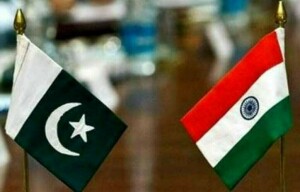UN Urges Restraint as India and Pakistan Tensions Escalate
NEW DELHI: Amidst escalating tensions, the United Nations has appealed to both India and Pakistan to exercise “maximum restraint.” This appeal follows reciprocal diplomatic actions taken by the nuclear-armed countries in response to a recent deadly shooting in Pahalgam, within Indian Illegally Occupied Jammu and Kashmir (IIOJK).
Relations between the two nations have deteriorated to a new low. India has accused Pakistan of backing “cross-border terrorism,” pointing to an attack by gunmen that resulted in the highest number of civilian casualties in the disputed Muslim-majority region of IIOJK in the last 25 years.
UN spokesman Stephane Dujarric addressed reporters in New York on Thursday, stating, “We strongly urge both governments to exercise the greatest possible restraint and to prevent any further worsening of the situation and events we have witnessed.”
He further added, “We believe that any disputes between Pakistan and India can and should be resolved peacefully through constructive mutual engagement.”
Indian Prime Minister Narendra Modi pledged on Thursday to pursue the gunmen responsible for the deaths of 26 civilians at the popular tourist destination of Pahalgam. Indian police have reportedly identified two of the three involved gunmen as Pakistani nationals.
Modi declared, “I say to the entire world: India will identify, track down, and punish every terrorist and those who support them.” This statement marked his first public address since the attack in the Himalayan region on Tuesday.
“We will pursue them to the ends of the Earth,” he asserted.
Islamabad has denied any involvement, dismissing attempts to connect Pakistan to the Pahalgam attack as “frivolous” and promising to retaliate against any Indian actions.
Following a rare National Security Committee meeting with top military officials, a Pakistani statement affirmed, “Any threat to Pakistan’s sovereignty and the security of its people will be met with strong reciprocal measures across all domains.” Prime Minister Shehbaz Sharif presided over the meeting.
Kashmir has remained divided between India and Pakistan since their independence in 1947.
Reports indicate that the Indian air force and navy conducted military exercises on Thursday.
Indian police are claiming that the three gunmen are affiliated with the Pakistan-based Lashkar-e-Taiba group.
Authorities have announced a reward of two million rupees ($23,500) for information leading to the arrest of each of the individuals.
In the wake of the attack, New Delhi has suspended a water-sharing treaty, declared the closure of the primary land border crossing with Pakistan, reduced diplomatic ties, and revoked visas for Pakistani citizens.
In response, Islamabad has directed the expulsion of Indian diplomats and military advisors, nullified visas for Indian citizens—excluding Sikh pilgrims—and closed the main border crossing from its side.
Pakistan has also cautioned that any attempts by India to halt the flow of water from the Indus River would be considered an “act of war.”
The Pahalgam attack represents a significant departure from typical targets of Kashmiri militants, who generally focus on Indian security forces.
Experts suggest that a military response from India remains a possibility, with some speculating it could occur within days or weeks.
In 2019, a suicide bombing that killed 41 Indian soldiers in Kashmir led to Indian airstrikes inside Pakistan, pushing the two nations to the brink of full-scale war.
Modi stated on Thursday, “Whatever little land these terrorists have, it’s time to reduce it to dust,” following a two-minute silence to honor the victims, nearly all of whom were Indian.
Historically, India has taken time to respond to previous attacks.
The Pulwama attack in IIOJK in 2019 was one of the deadliest in recent years.
Twelve days later, Indian fighter jets launched airstrikes on Pakistani territory.
Currently, Indian security forces have initiated an extensive search for the Pahalgam attackers, resulting in numerous detentions.
The attack has ignited anger among Hindu nationalist groups, with students from IIOJK studying at institutions across India reporting instances of harassment and intimidation.



Comments (0)
No comments yet. Be the first to comment!
Leave a Comment